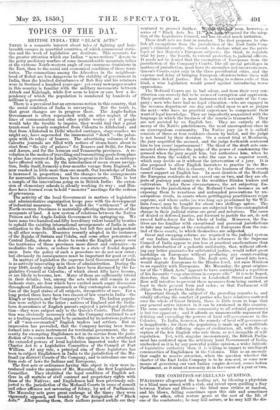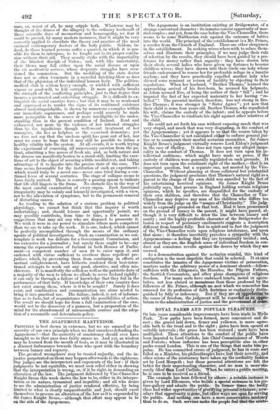THE CONDITION-OF-IRELAND QUESTION.
D'Arannsur allegorized the healing art, by likening a physician to a blind man armed with a. club, and intent upon quelling a fray between Nature and Disease : the blind man strikes at random, and his blows, falling sometimes upon this side and sometimes upon- the ether, often restore peace at the cost of the life of one of the combatants ; he may kill nature, or he may kill the die-
ease, or, worst of all, he may cripple both. Whatever may be thought of the fitness of the allegory to the ordinary leecheraft of these scientific days of mesmerism and homoeopathy, we fear it could be proved, by many modern instances, that it might be very correctly applied to elucidate the theory and practice of the most eminent contemporary doctors of the body politic. Seldom, in- deed, do those learned persons suffer a quarrel, in which it is pos- sible for them to interpose, to be fought out to its proper conclu- sion without their aid. They usually strike with the impartiality of the blindest disciple of Galen ; and, with like uncertainty, their blows may fall either upon the social disease or upon the tie nzedieatrix nature; whose desperate struggles have occa- sioned the commotion. But the meddling of the state doctor does not so often terminate in a merciful finishing-blow as does that of the physician of the individual human body. The politico- medical club is seldom heavy enough, or wielded with sufficient vigour or good-will, to kill outright. It more generally breaks the strength of the conflicting principles, just to that degree that insures a protracted and enfeebling struggle. It is difficult to ex- tinguish the social curative force ; but that it may be so weakened and oppressed as to render the signs of its continued existence almost 'indistinguishable, is shown by numerous examples within our immediate cognizance, and perhaps could scarcely be made more perceptible to the senses or more intelligible to the under- standing than in the present condition of Ireland. Rent and exhausted, not more by the violence of her internal struggles than by the injudicious though well-meant treatment of her managers, she lies as helpless as the exorcised demoniac; yet we dare not say that the unclean spirit has gone out of her, nor must we cease to hope that it may still be possible to infuse a healthy vitality into the system. At all events, it is worth trying the experiment of removing all unnecessary coercion from the pa- tient, admitting a free access of fresh air, and, as both nature and the disease are manifestly beaten to a stand-still, limiting the exer- tions of art to the object of securing a little needful rest, and taking advantage of it to inquire into the precise state of the case. The time seems favourable for the institution of such an experiment ; which would truly be a novel one—never once tried during a con- tinued fever of several centuries. The stage of collapse seems to have fairly arrived. There is scarcely a passing spasm to indicate that life still lingers in the frame. No obstacle lies in the way of the most careful examination of every organ. Each functional irregularity may be calmly and leisurely investigated, with a view, not to the alleviation of symptoms, but to the permanent removal of disturbing causes. As tending to the solution of a curious problem in political physiology, we cannot but think that this inquiry is worth undertaking ; and, should leisure and opportunity permit, we may possibly contribute, from time to time, a few notes and suggestions that may aid any who are disposed to prosecute it. We wish it were in our power to stimulate others more competent than we are to take up the work. It is one, indeed, which cannot be perfectly accomplished through the means of the ordinary agents of political investigation. Such an examination as we con- template is work too delicate for a Government Commission, and too extensive for a journalist ; but surely there ought to be—say among the representatives of Ireland in both Houses of Perna- ment—a competent number of men fit to enter upon it, and endowed with virtue sufficient to overbear those repellent pre- judices which, by preventing them from combining in efforts at mutual enlightenment, have hitherto rendered their best-inten- tioned attempts to work out any good, abortive, and often mis- chievous. It is manifestly the selfish as well as the patriotic duty of a majority of the men to whom we allude to serve Ireland rightly : it can only be through a failure of knowledge that they fail in the performance of that duty. If knowledge of their own country does not exist among them, where is it to be sought? Surely it does exist, and combination and communication are alone needed to bring it into practical use. The failure, indeed, is not of informa- tion as to facts, but of acquaintance with the possibilities of action. The result we should hope for from a full examination of the case, would not be the discovery of a panacea, but a preparation of the mind for the abandonment of unreasonable courses and the adop- tion of a reasonable and determinate policy.



























 Previous page
Previous page